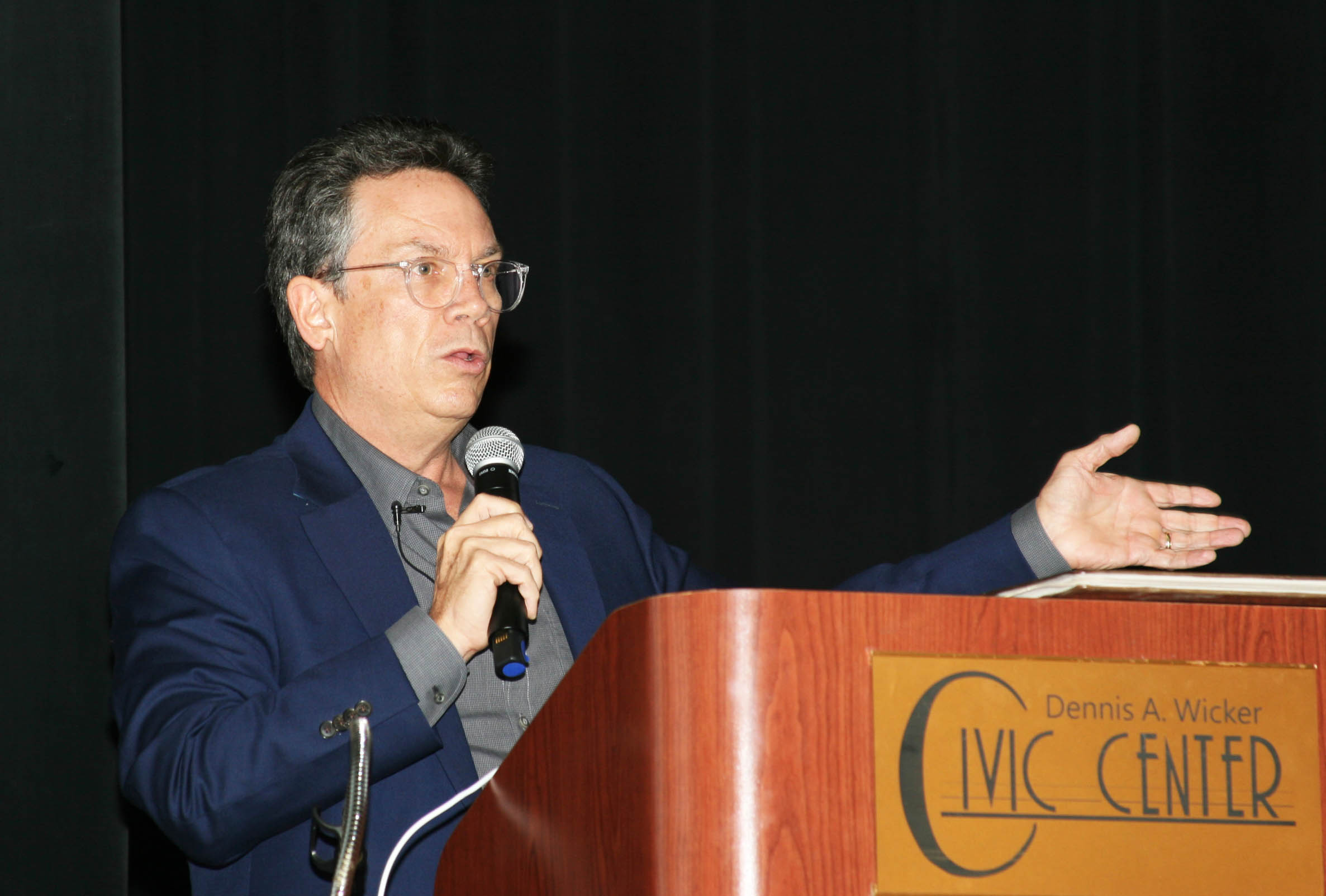
Bill Adair, creator of the Pulitzer Prize-winning website PolitiFact and a leader in the global fact-checking movement, visited Central Carolina Community College on Oct. 23.

SANFORD - With an increasingly fragmented media landscape and politicians playing loose with the truth, checking claims made in the political arena is more important than ever to maintain a vibrant democracy.
That was the assessment of Bill Adair, creator of the Pulitzer Prize-winning website PolitiFact and a leader in the global fact-checking movement, during an hour-long presentation on Oct. 23 at Central Carolina Community College.
Adair is currently the Knight Professor for the Practice of Journalism and Public Policy at Duke University and heads its journalism program as Director of the DeWitt Wallace Center. Before arriving in Durham, he spent 24 years as reporter and editor for the Tampa Bay Times, formerly the St. Petersburg Times, and built PolitiFact into the largest fact-checking effort in history, with affiliates in 18 states and Australia.
The bulk of his presentation focused on how fact checking works, using the example of PolitiFact, which rates most political claims on its "Truth-O-Meter" as either true, mostly true, half true, mostly false or false. But "claims that are not just false, but ridiculously false" earn the special designation "Pants On Fire!," which started out as a joke for lighthearted items.
"The first 'Pants On Fire!' was given to Joe Biden for a claim he made that President Bush was brain dead," Adair said to laughter in a packed auditorium at the Dennis A. Wicker Civic & Conference Center. "We said that Dr. Biden had not done sufficient diagnosis to make that claim."
That designation became so identified with PolitiFact that it has even been trademarked. "So, if you go by a playground and you hear a kid say, 'Liar, liar pants on fire,'" Adair said, "he owes me five bucks."
While the truth of political claims distills neatly into one of six ratings, there's a lot of research and analysis behind it all. Adair projected onto the screen a sample page from the PolitiFact website where one very short claim had been evaluated.
To the left side of the page was the claim and a detailed analysis, showing the evidence and logic used to evaluate the claim. To the right were details about when the statement was made and specifics about the reporting and other sources used in the analysis, many with links to the original documents online. At the bottom: a brief conclusion about the claim and the Truth-O-Meter rating assigned after consultation with three editors.
"I call it reported conclusion journalism," Adair said. "The reporters are objective -- they're not partisan, they're not Republican, they're not Democratic. They are gathering facts, but then they are developing a conclusion on the relative accuracy of the statement."
Does fact checking matter? Adair believes it does.
Responding to a question, he mentioned how one special interest group recently said it was pulling a political ad after receiving a "false" rating from PolitiFact. And then there was a campaign he wouldn't name that discussed what PolitiFact ratings they might receive for different versions of a claim in one of their political ads -- and how low a rating they were willing to accept.
"They're watching; they know we're out there," Adair said. "A lot of them care, so I find that really encouraging."
The challenge now, he said, is to make fact checking even more useful to people following political news -- and that means providing fact checks in real time.
That's possible because politicians often repeat claims that have already been checked. Matching existing checks to claims being made during a live speech, for example, becomes a complicated technical question: How do you make that match quickly and on the fly?
Adair gave a quick overview of how his work at Duke is now trying to take voice from a speech, convert that voice to text, compare that text to a database of previously published fact checks and display the assessment -- all in less than one minute.
There are all sorts of hurdles to overcome, but matches are already successful more than 90 percent of the time. His team is now refining the computer algorithm so their success rate becomes virtually 100 percent and everything happens faster than it does now.
Adair's appearance was part of CCCC's Academic and Cultural Enrichment Series, which draws notable scholars each year to engage university transfer students in intellectual discussion. Bianka Stumpf, CCCC's lead social sciences instructor and director of the enrichment series, said students studying history, humanities, political science, communication and sociology were in the audience to hear Adair, as were some members of the community.
After the lecture, Adair continued his appearance on campus to meet with broadcasting technology students for a question-and-answer session in their law and ethics course. His appearance was made possible with a North Carolina Humanities Council Special Initiative Micro Grant, funding designed to help understand and explain what it means to be an informed citizen in a democracy.
For more information on Central Carolina Community College, visit www.cccc.edu.

Bill Adair, creator of the Pulitzer Prize-winning website PolitiFact and a leader in the global fact-checking movement, visited Central Carolina Community College on Oct. 23.